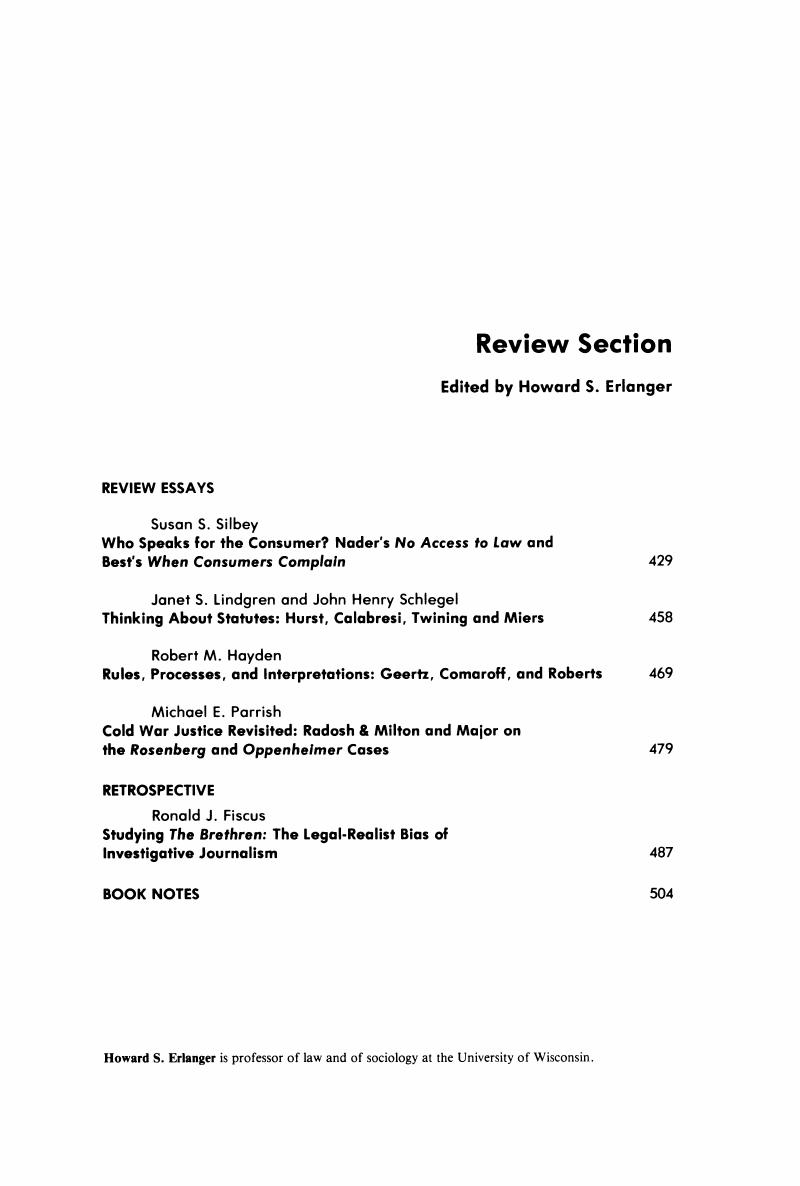Article contents
Thinking About Law and Its Alternatives: Abel et al. and the Debate Over Informal Justice
Published online by Cambridge University Press: 20 November 2018
Abstract

- Type
- Review Essay
- Information
- Copyright
- Copyright © American Bar Foundation, 1984
References
1 See Calvin Trillin, Harvard Law, New Yorker, Mar. 26, 1984, at 70, where he describes it this way: “Critical Legal Studies is sometimes explained as a way of ‘decoding’ the legal system to show that it is incoherent where it presents itself as logical, and that it is loaded in favor of one class where it appears to be accessible to all, and that it operates not to produce clear doctrines but to mask essential contradictions”.Google Scholar
2 . Christie, Nils, Conflicts as Property, 17 Brit. J. Criminology 1 (1977).CrossRefGoogle Scholar
3 David Sudnow, Normal Crimes: Sociological Features of the Penal Code in a Public Defender Office, 12 Soc. Probs. 255 (1962);Stuart A. Scheingold, The Politics of Rights (New Haven: Yale University Press, 1974); Robert Lefcourt, ed., Law Against the People (New York: Random House, 1971).Google Scholar
4 . See, e.g., Danzig, Richard, Toward the Creation of a Complementary, Decentralized System of Criminal Justice, 26 Stan. L. Rev. 1 (1973).CrossRefGoogle Scholar
5 . Berman, Jesse, The Cuban Popular Tribunals, 69 Colum. L. Rev. 1317 (1969); Lubman, Stanley, Mao and Mediation: Politics and Dispute Resolution in Communist China, 55 Calif. L. Rev. 1284 (1967).Google Scholar
6 . Burger, Warren, Agenda for 2000 A.D.-A Need for Systematic Anticipation, 70 F.R.D. 83 (1976) (address delivered at the National Conference on the Causes of Popular Dissatisfaction with the Administration of Justice, Apr. 7–9, 1976, St. Paul, Minn.).Google Scholar
7 E. P. Thompson, Whigs and Hunters (New York: Pantheon Books, 1975).Google Scholar
8 Eugene D. Genovese, Roll, Jordan, Roll 25–49 (New York: Pantheon Books, 1974).Google Scholar
9 Richard Quinney, Critique of Legal Order: Crime Control in Capitalist Society (Boston: Little. Brown & Co., 1974).Google Scholar
10 See, e.g., Max Horkheimer, Dawn and Decline 71–72 (New York: Seabury Press, 1978).Google Scholar
11 In fairness, it is also true that much of conventional social science analysis of law and society is vulnerable to a similar criticism.Google Scholar
12 Talcott Parsons, The Law and Social Control, in William M. Evan, ed., Law and Sociology (New York: Free Press of Glencoe, 1962).Google Scholar
13 . Trubek, David M., Where the Action Is: Critical Legal Studies and Empiricism, 36 Stan. L. Rev. 575 (1984).Google Scholar
14 Jack Ladinsky & Charles Susmilch, Major Findings of the Milwaukee Consumer Dispute 9udy (paper presented at the conference, “When Consumers Complain,” June 10, 1982, Madison, Wis.).Google Scholar
15 Jeffrey FitzGerald & Richard Miller, The Use of Lawyers and Their Effectiveness in Civil Legal Disputes: A Cross-National Study (unpublished manuscript).Google Scholar
16 . Sarat, Austin, Alternatives in Dispute Processing: Litigation in a Small Claims Court, 10 Law & Soc'y Rev. 339 (1976).Google Scholar
17 . Schwartz, Richard D., Social Factors in the Development of Legal Control: A Case Study of Two Israeli Settlements, 63 Yale L.J. 471 (1954).Google Scholar
18 Trubek, supra note 13.Google Scholar
19 Lazerson shows how the landlords responded to this by pressing for another type of informal procedure, in which they fared considerably better.Google Scholar
20 Hubert L. Will, The Role of the Judge in the Settlement Process (Washington: Federal Judicial Center, 1977).Google Scholar
21 . Woll, Peter, Informal Administrative Adjudication: Summary of Findings, 7 U.C.L.A. L. Rev. 436 (1960).Google Scholar
22 Joel F. Handler, Controlling Official Behavior in Welfare Administration, in Jacobus ten Broek, ed., The Law of the Poor (San Francisco: Chandler Publishing Co., 1966).Google Scholar
23 Eugene Bardach & Robert A. Kagan, Going by the Book (Philadelphia: Temple University Press, 1982).Google Scholar
24 Roman Tomasic & Malcolm M. Feeley. eds., Neighborhood Justice: Assessment for an Emerging Idea (New York: Longman, 1982).Google Scholar
25 Jack Ladinsky, Stewart Macaulay, & Jill Anderson, The Milwaukee Dispute Mapping Projcct: A Preliminary Report, Dispute Processing Research Program working paper 1979–3 (University of Wiscon sin-Madison Law School, 1979).Google Scholar
26 Ladinsky & Susmilch, supra note 14.Google Scholar
27 M. P. Baumgartner, Aspects of Social Control in a Suburban Town (paper presented at annual meeting of the American Sociological Association, New York, 1980).Google Scholar
28 Leonard Buckle & Susan Thomas Buckle, Varieties of Informal Dispute Processing in American Neighborhoods: Some Reasons for Judicial Reform (1982) (unpublished draft manuscript).Google Scholar
29 Sarat, supra note 16.Google Scholar
30 John N. Hazard, Settling Disputes in Soviet Society: The Formative Years of Legal Institutions (New York: Columbia University Press, 1960).CrossRefGoogle Scholar
31 Herman, supra note 5.Google Scholar
32 Lubman, supra note 5.Google Scholar
33 Fred Dubow, Justice for People: Law and Politics in the Lower Courts of Tanzania (Ph.D. diss., University of California-Berkeley, 1973).Google Scholar
- 1
- Cited by




